What follows is a spoiler laden discussion of the book Ringworld. Beware if you’re worried about such things.
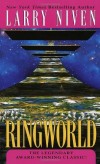 On his 200th birthday, Louis Wu is recruited by an alien to join an expedition to an unknown destination. The reward is the plans for a spaceship drive beyond anything the human race has yet invented. He and the other recruits soon discover their destination is Ringworld, a sort of modified Dyson sphere which consists of a single ring spinning around a sun. Louis, his girltoy, and two aliens soon crash into Ringworld and must try to discover just what it is, who made it, and how they can escape.
On his 200th birthday, Louis Wu is recruited by an alien to join an expedition to an unknown destination. The reward is the plans for a spaceship drive beyond anything the human race has yet invented. He and the other recruits soon discover their destination is Ringworld, a sort of modified Dyson sphere which consists of a single ring spinning around a sun. Louis, his girltoy, and two aliens soon crash into Ringworld and must try to discover just what it is, who made it, and how they can escape.
K: Up for discussion is Ringworld by Larry Niven, winner of the 1970 Nebula award. This book was also apparently popular enough to spawn a franchise, but I think before we even get into discussing the plot or the details, we have to start by looking at the massive massive genderfail/misogyny that pervades this entire novel.
K: I was so astounded by it that I really am not sure where to begin.
J: This is another one of the books I’d actually read before. This one I believe I read in junior high, maybe early high school, when I was just blowing through things in the SF section of the local library. My memory of it was really limited to ‘hard science fiction, some aliens, a ringworld, boring’. So it surprised me when it was actually readable. But I also hadn’t remembered there being women in it! Or.. women-like objects, more accurately.
K: Yes, that’s really a perfect description. They certainly weren’t fully realized characters with agency or any sort of purpose. In fact, the “main” female character in the book, Teela Brown — it seems in the end her entire reason for being in the book was her complete -lack- of agency. Things just happened to her (and thus to our far more important male or apparently-male characters) without her knowledge, consent or even interest. Now, given that she was a completely rubbish female character to begin with, apparently on the trip because our protagonist couldn’t go without sex for a couple months without being tempted to rape one of his alien male companions (Oh yes, very funny joke, Larry Niven. Ha ha.). She has no training, no brains, no abilities beyond spreading her legs.
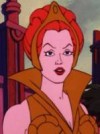 [At least I never slept with Prince Adam.]
[At least I never slept with Prince Adam.]
J: But occasionally surprises the main character with how smart she is! At infrequent times. And just when she disappears, (and he thinks she’s dead), another woman comes in to have sex with him. Because we wouldn’t want him to go without.
K: The magic hooker with the unpronouncable name! Does she have a heart of gold? I’m not sure we actually saw enough of her to decide, but I’m leaning toward yes. At least the hooker was apparently a few hundred years old, a far more appropriate age for our 200 year old “hero” than a 20 year old ingenue whose great-grandmother he slept with. There’s no other way to describe that situation except gross.
J: And if their whole characterization wasn’t enough, he also goes and sells whatshername the first girl to the Ringworld guy! Rather than, you know, convince him that he doesn’t own her. Just.. oh, it’s easier if I sell you to him. ‘Okay!’
K: I was completely baffled by that. Now, we do have some evidence (see: magic hooker) that the Ringworld society wasn’t exactly egalitarian prior to the collapse of civilization. But it’s extremely telling that Niven’s take on the collapse of even an unequal civilization is that their first step is to make women literal property. Why? Seriously, why? He doesn’t even attempt to dress it up with the idea of a dowry or a bride-price, or explain why, and no one questions it. It’s just: ‘oh, women are slaves? Ok, well, here, let me sell you to him’.
J: Oh, he makes a lot of leaps without any good explanation to back them up. (‘He’ being kind of both Niven and the main character here.) Oh, no metal to mine, so clearly civilization cannot re-emerge. There’s bacteria in your gut! It could mutate! (And there was no other bacteria anywhere? Not.) You’re lucky, therefore you have no free will. Nessus might be male and take a female mate, or he might be female and take a male mate, or he might be male and take a male mate. But never once does it cross his mind that they might both be female.
K: Yes, let’s talk about the aliens for a bit. We have three species represented here, if we don’t count the Ringworlders as a fourth. And apparently Niven gets props from many for coming up with detailed and very different alien societies. I can see that to a certain extent, but once again his big issue is gender relations. Nessus (the puppeteer) implies that reproduction for his species requires three. Okay, fine. Except that one of the three involved is ‘property’ and nonsentient. Er, okay, fine. I don’t like that, but if you want to have a species where that is the case I can see how it might be interesting to explore. Not that it is explored or anyone comments upon it. Because ha ha, silly us, our other alien species, the catlike Kzin, -also- have a second sex which is nonsentient. And in both cases, as far as the reader is concerned, we are told that the aliens we see are analagous to males, implying (or in the case of the Kzin, flat out stating) that the nonsentient sex is the female one.
K: Once is interesting, twice is a trend. And given the fact that Niven made no effort to then contrast the human race with these aliens by making the human females dynamic, intelligent and interesting, it just smacks of a lack of interest in portraying females at all. The only reason the human females weren’t completely nonsentient is because obviously everyone knows that’s not the case. (Though apparently they aren’t quite up to male standards either.)
J: It’s bizarre too. Because Nessus says their only options to not breed are surgery or abstinence. I mean.. couldn’t you have sex with one person and not the both required? Not that we have any clue how any of it is accomplished. Because while he doesn’t shy away from nice human hetero sex scenes, he’s extremely vague about the aliens. And you’re right that we’re supposed to surmise that the nonsentient puppeteer is female, because Louis doesn’t ever imagine otherwise. Like if he had thought Nessus and the Hindmost both female, he would’ve had to imagine the nonsentient one as male and he couldn’t do that. And if both of those races are used to females being nonsentient, they should’ve been treating whatshername (I keep wanting to call her Trillian, for reasons I can get into later.) like crap. And Louis should’ve been all ‘What’re you doing, guys? She’s as sentient as me.’
J: Not that I want Nessus or the Hindmost to actually be female! Because /then/ we get the characterization of kzinti as male and warlike and fierce and strong. And the puppeteers as female and cowards and manipulators.
K: I didn’t entirely get the problem with the puppeteers and breeding. Nessus also says that abstinence causes its own problems and remarks that no race can go without sex for very long without it causing issues. And after he said that, I waited for Louis to contradict him, since humans have long practiced a lifetime of celibacy with no issues at all. Except he didn’t. Instead, Louis decides he may as well agree to bring along a completely unqualified 20 year old, since she’s eager to bed him and then he won’t have to be deprived. He even reflects on how stupid he was in the past for going on his solo ‘sabbaticals’ without taking along a woman in stasis he can wake up whenever he gets the urge.
J: Gah, yea. I’d forgotten he’d thought that. Like the human race wouldn’t have developed a very nice realistic sex doll he could’ve brought instead. The doll could’ve seemed just as sentient as he wanted. Which I’m guessing is not very. Was there also something in here about men only being able to reproduce until they’re in their 40s or 50s? Showing a clear lack of understanding of human reproduction!
K: There was indeed, though I think it was 50s or 60s. In any case, I can’t explain it, since even in 1970 I can hardly believe anyone thought that was true, since there were countless examples of it being untrue.
J: If the boosterspice made you sterile after you used it once or a few times, then sure, but.. that’s not stated.
K: Because that might confuse people into thinking our virile hero is impotent somehow! When of course he’s not. Every woman ever wants to sleep with Louis Wu. Though it’s never exactly explained why.
J: Why was he randomly called by his full name here and there? I can’t take his full name seriously in any case. After the titles of the first two chapters, I couldn’t take anything seriously! Which is when my mind started going down the Hitchhiker’s path. For those playing along at home, the first two chapters are: Chapter 1 – Louis Wu | Chapter 2 – And His Motley Crew
K: Ha! I did not actually notice that at all. Anyhow, I started equating Teela to Trillian fairly early on, but then gave it up. As underused and underdeveloped as Trillian is, she’s an astrophysicist, beautiful -and- smart. At least in the books. Teela is just a scream machine, someone for Louis to shake his head at, who conveniently disappears for the last third of the book so they can solve the problem of how to get out of the Ringworld.
J: Oh, Teela gets to be part Trillian and part Heart of Gold.. speaking of women with a heart of gold. :> And then we had a two-headed alien. So I really started to wonder how much Douglas Adams was using Ringworld to riff off of.
K: That is actually a good question. One which I’m not qualified to answer, but I can’t imagine it wasn’t something he had read and was aware of when writing Hitchhiker’s.
J: Didn’t Arthur Dent also meet Trillian at a party? But anyway.. the other reason I couldn’t take Louis Wu seriously as a name is that he was trying too hard to be Chinese without being Chinese. It was.. well, weird, but also racist. We first meet him he’s altered his true appearance and wearing clothes to make him nothing but a caricature of what a Chinese man is supposed to look like. Dressed up for his party? Or does he always present himself that way except when he’s off exploring ringworlds?
K: From the very brief introduction we have to current Earth society before we leave the planet, it sounds to me like extensive costuming and colorizing is typical of the present society. Teela, for instance, looks not at all like her presented appearance at the party. I do wonder why this seems to be a relatively common future trope (we last encountered it to this extent in Babel-17) — but maybe I’m just out of touch, since I do not like jewelry, perfumes make me ill, and I have way better ways to spend my money and time than worrying about cosmetics. I guess if modification was easy and cheap I might well use it to remove some weight.
J: The book that comes to mind is Westerfeld’s Uglies series. I think when a society is decadent and bored, they supposedly start playing with cosmetics, clothing, accessories, etc. If it was cheap and relatively safe and painless, I might do a few things. But why look like a boring old stereotype of a Chinese man? At least try to look like someone in particular, or be, y’know, different. Horns, wings, fur. Or if you felt that ideally reflected the you inside, then.. why remove it all to make a space trip?
K: I wasn’t entirely sure about that either, except that they weren’t going to be able to bring their cosmetics with them on the trip, and I’m sure real astronauts aren’t allowed to wear such things(?), so perhaps it’s something he included without even thinking about it.
J: Hrm. Maybe.
K: Now, the technology was interesting. Aside from the various poorly explained youth serums (the boosterspice, and then the Ringworld equivalent which somehow gave you ’50 years of youth’ per dose.) We have the transporter booths, the puppeteer equivalent, moving sidewalks — and then Louis mentions using a typewriter. What?
J: Did he? I don’t remember that. What kind of threw me was ‘intercom’ also including video. Since to me ‘intercom’ is very specific. Unlike ‘comm’, which I take more generally, to cover a wide range of possibilities.
K: Video intercom isn’t unheard of, so that didn’t really pop out at me. And I had to laugh at the moving sidewalks (slidewalks!) because really, that idea is so impractical. They can’t even keep the elevators working in subway stations. They can’t even properly plow the sidewalks we have. Can you imagine municipalities trying to keep miles of conveyor belts working? Outside? And yet… it’s such a popular idea. Like flying cars.
J: Bunch of lazy people. :) That reminds me though.. that he thinks teleporters will homogenize the planet. Moreso than television or other communications technologies. Like there wouldn’t be a backlash against, say, the Louvre being turned into a Walmart.
K: Yeah, it’s pretty clear now that increased communication and consumerism is what’s going to homogenize the planet. Transportation may come later but it’s not going to be at all essential.
J: If anything, it may have the opposite effect. If I can teleport anywhere I want, am I going to go to Dunkin Donuts? No. I’ll go to whoever I think is the best donut place on the planet. The number of Dunkin Donuts then won’t be based on ‘well, the closest one is a mile from here’, but on how many are needed to keep up with demand.
K: That’s an interesting point. I hadn’t thought of that, but it’s very true. We put up with a lot of mediocre stuff because of convenience, but this would really change the nature of convenience in a fundamental way.
J: There is just so much in here I wish Niven had been concerned with exploring instead of the stupid Ringworld. What’s Earth like? What are the colonies like? What are the alien societies like? Not that I want to read the other books to find out. I think they’d just tick me off.
K: And there’s no real guarantee that they focus on the information you want. I think here again, he got interested in the idea of a Dyson sphere and wanted to figure out how to improve it. I can’t fault him for the thought experiment. It’s just the execution which is so unfortunate, because it completely takes away from the fact that the idea of a ‘ringworld’ is actually interesting. But he didn’t really explore that either, because as soon as we get there our characters are mostly trying to escape!
J: And I’m still confused why the place is full of humans. The explanation is supposed to be that the people who made the ringworld also wandered by Earth and half-heartedly terraformed it, brought some chimps and Neanderthals with them and.. what? We evolved from those Neanderthals or we descended from the ringworld engineers? And where do the dinosaurs come into it?
K: I suspect the history may be better fleshed out in future books, but yes, the impression I got was that Niven was saying we were somehow evolved from the pets of the Ringworld humans. So we were distantly related to them, but not -them-. I don’t know where the dinosaurs come in.
J: And none of these other alien races had run into humans on any other planet other than the ones who wandered there from Earth? Only Earth humans managed to make a go of it.
K: Well, I think the Earth thing was somewhat meant to be speculation. Because really it doesn’t make a -whole- lot of sense. Earth is supposedly 200 light years away from Ringworld, and no one ever encountered these Ringworld humans before, so presumably most of their empire was away from ‘Known Space’ which is the area local to Earth, roughly 70 light years across according to the book. So the odds that Earth, so very distant, was really part of it? Dunno. It seemed like an awfully silly coincidence, but as it was never properly followed through with in this book I can’t say either way.
J: Also the arrogance. Oh, these people can’t fly the cities anymore. They think we’re gods. So they’re uncivilized and backwards and barbarians and such a shame their civilization fell.
K: Shoddy reasoning was all over the place. There are lots of leaps of logic that are only barely supported by the available facts (ex: the whole Earth terraforming business). Like, they all happily conclude that people invented the floating cities before the development of the life extending serum, because people who don’t live long lives are more likely to be reckless with the life that they have. Um, what?
J: Yea, bizarre. And how is living in a floating city any less safe than flying around on cycles or in spaceships? When it comes to the luck thing, I could buy that a very lucky person would be reckless and careless. I couldn’t buy that she couldn’t empathize with people. That ‘I’m blind’, ‘But can you /see/?’ thing was just weird. And why would her luck have to drag her all the way to the ringworld to teach her how to uh.. be in pain? She couldn’t burn her feet on Earth? And I refuse, I refuse to believe this guy who now /owns/ her is the best possible person in the world for her and isn’t she so ‘lucky’ to have been united with him.
K: Niven (through Louis) flat out questions her humanity at several points in the book. I found it fairly hard to believe she was -that- distanced from the normal human experience. And yes, I strongly object to the manner in which she was disposed of by finding that random dude and then… randomly sleeping with him. And even more randomly being sold to him. The whole subplot of Teela’s luck was just weird and confusing.
J: And he’s really old. So she hasn’t even traded in for a man closer to her own age. :P
K: After reading this, I have to wonder why this universe became such a favorite that it spawned so many sequels, prequels and spinoffs. There is so little to recommend it. The basic idea– I’m just not sure how you can rescue it from all of the fail.
J: I don’t know.. the only redeeming quality I can see is that the two aliens were interesting. Although not entirely well-rounded.
K: They aliens were interesting, sort of. The puppeteer moreso than the Kzin. I have a prejudice against cat aliens.
J: I didn’t really read him as a cat. Even though he did say kittens at one point, I think. I guess I pictured more that big Looney Tunes monster. Whose name Google now informs me is Gossamer.
K: I can’t say whether or not I would have immediately read him as a cat, though I’m sure that his felinity was mentioned. But really I spent the better part of the 90s seeing those Man-Kzin War books being promoted at the bookstore when I went in to buy something else, so I have the cover images burned into my brain.
J: Ah. Well, I don’t have trouble with cat aliens per se. They do seem to be all over the place though.
J: Maybe you can explain something to me. It’s probably physics. So at the end, they pull the ship up the mountain and it’ll go down the hole in the middle and out into space, yea? It that because centripetal force is going to erm.. propel them that way? And then what’re they doing? Hanging out in space? I just.. why couldn’t they just take off again? Why did they have to go ‘down’ and through the hull?
s/It/Is
K: The problem was, to put this in the terms of technobabble from other series, all their impulse engines were burned up by the sun, but their hyperdrive was contained within the hull rather than fastened outside of it. So the only way they could move was by turning on the hyperdrive, which would have caused massive destruction if they tried to do it inside the ring instead of out of it. Now, I don’t recall an explanation for how the hyperdrive worked, but presumably it works on the same basic principle as most FTL drives and warps local space allowing the ship to escape Einsteinian space and enter a dimension where the speed limit isn’t the speed of light. Doing this on top of a planet or planet-like structure is probably a very bad idea.
J: I was just trying to picture a bunch of different alternative escape plans. But I couldn’t think of one that’d work. So I guess I get it now. And they must’ve landed near the one spot they could escape through because Teela was lucky and it was in her best interests to get Louis as far away from her as possible.
K: Hahaha. Yeah, that must be it.
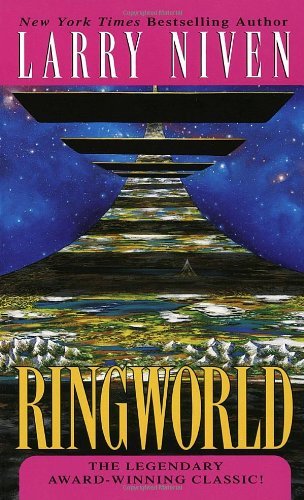

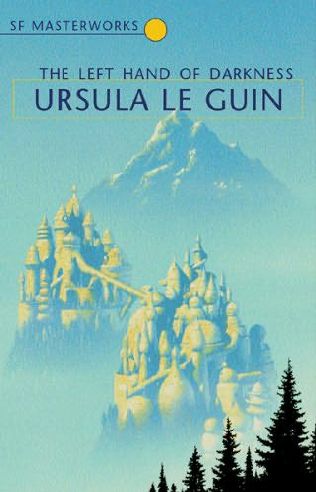
 First Mobile Genly Ai is on the planet Gethen, otherwise known as Winter, to convince the inhabitants to join the interplanetary Ekumen, for mutual benefit and exchange of ideas, etc. Coping with the harsh cold environment is the least of his problems, as he seems poorly equipped to deal with the planet’s governments and its people. The fact that they all exist in a non-gendered state most of the time, until they enter kemmer once a month when they can be come male or female, leaves him questioning his own masculinity.
First Mobile Genly Ai is on the planet Gethen, otherwise known as Winter, to convince the inhabitants to join the interplanetary Ekumen, for mutual benefit and exchange of ideas, etc. Coping with the harsh cold environment is the least of his problems, as he seems poorly equipped to deal with the planet’s governments and its people. The fact that they all exist in a non-gendered state most of the time, until they enter kemmer once a month when they can be come male or female, leaves him questioning his own masculinity.
 In this 1968 winner, Mia Havero is a 12-year old girl living on ship carved into an asteroid, part of the remnants of the human race who escaped Earth prior to its destruction. In just two years, she faces the Trial, which all children living on the ship must go through. And many don’t live through. We follow her adventures growing up on the ship, losing and making friends, and training to help her survive the Trial. When she and a group of other 14 year olds are dropped off on a colonized planet, they face not only the elements, treacherous terrain, and wild animals, but the unknown colonists as well.
In this 1968 winner, Mia Havero is a 12-year old girl living on ship carved into an asteroid, part of the remnants of the human race who escaped Earth prior to its destruction. In just two years, she faces the Trial, which all children living on the ship must go through. And many don’t live through. We follow her adventures growing up on the ship, losing and making friends, and training to help her survive the Trial. When she and a group of other 14 year olds are dropped off on a colonized planet, they face not only the elements, treacherous terrain, and wild animals, but the unknown colonists as well.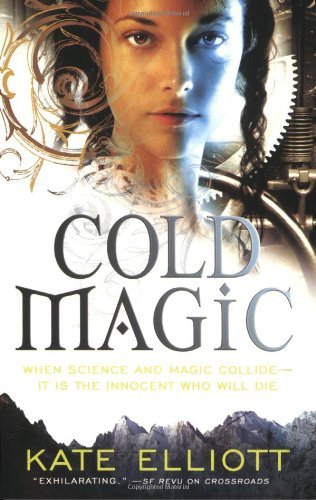
 The Plot
The Plot
